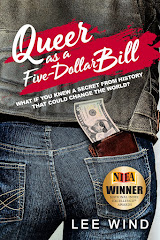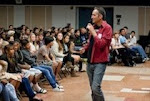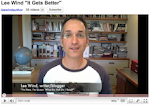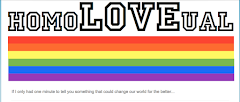
Edited by
Jane SummerPublished in 2004 by Alyson Publications
When I first tried locating this book, I had no success. It turns out that "Not the Only One" is out of print, and that is such a shame. Filled with entertaining and relatable stories this anthology is incredibly fun to read. Each selection is creative and shows a different aspect of GLBTQ culture. (Used copies are still available at Amazon, and hopefully in some libraries...)Mrs. Houdini’s Wife by Angela Brown
While supporting her husband, Harry Houdini, at one of his many shows, Bess Houdini meets Berta Thomashefsky, otherwise known as Tom, a beautiful Jewish woman who feels more comfortable in men’s clothing. The two become close and bond over Tom’s Jewish faith. As their relationship turns romantic, Bess falls for Tom’s masculinity and vivaciousness.
Guarding the Punch- and Alice by
Bonnie ShimkoWhen Charlotte first laid eyes on Alice Weinstein in 6th grade, she knew that Alice was the one. Now at the senior prom, forced into a prom dress monstrosity by her mother, Charlotte talks to Alice, the prom queen, and discovers that they have had mutual feelings all along.
It Feels Great by Pam McArthur
When a girl named Gina comes out to her school, she inspires another girl to confront her confusions about her sexuality and go to a Gay and Lesbian Youth Alliance meeting. There she gains the confidence to tell her sisters about herself.
Sara by
Michael Thomas FordThomas, a rather astute fourth-grader, uses his imaginary friend Sara to help him escape his nagging parents.
Fooling Around by
Claire McNab Brett’s mom completely freaks out when Steve’s dad calls her to tell her that he caught Brett and Steve kissing at a party one night. Brett doesn’t understand what warrants this type of reaction from his mom, who tells him to play off the whole ordeal as a joke, even though Brett knows that it was anything but. He then discovers that his dad is more like him than he could have ever known.
The Widest Heart by
Malka DruckerA girl meets Marcia, an overweight and overworked girl from a Greek family. The two become great friends and dream of moving to the east coast and starting their own book shop. However, Marcia’s strict Greek father stands in their way, because he does not believe that Marcia should go to college, since she’s a girl. The two are driven apart but one day Marcia introduces her friend to Dannie, her girlfriend.
Somebody’s Boyfriend by
Laurel WinterWhen Alex meets his sister Maggie’s boyfriend Jeff, he finds that he has fallen head-over-heels in love with him. One day his sister divulges that the two haven’t even kissed and Alex ashamedly sees a ray of hope. Maggie employs her brother’s help to find out if Jeff really likes her, but Alex finds out so much more.
Her Sister’s Wedding by Judith P. Stelboum
Veronica is attending her sister’s wedding as a bridesmaid, but all she can think about is how she will never be able to have this ceremony with Leslie, her love. She lets a boy named Buddy dance with her and he even asks her out, but she soon realizes that she can’t live this lie anymore.
Rain by
Christina ChiuA girl feels as though she can’t get out of the shadow of her over-achieving sister, Rainy. Rainy and her best friend Jade had always been the ones to get A’s while Rainy’s sister got by with B’s and a football player boyfriend. Rainy’s sister becomes jealous when Rainy is the one to receive the scholarship. However, one night Rainy and Jade are found together by Rainy’s twin and she realizes how much she needs to let Rainy go to college.
New York in June by
Brian SloanA boy and three of his peers from his school newspaper get the opportunity to go to Columbia University for a week to study journalism, but they end up learning so much more. Through the trip the boy starts to realize his feelings for his older editor, Roger, and with the help of the musical A Chorus Line, the boys are able to express their feelings.
Crossing Lines by Judd Powell
Forrest and his friends used to make fun of the reclusive old man named Mr. Mueller in their trailer park by calling him a Nazi. When he is a teenager, Forrest begins to realize that this pains the old man and decides to help him out. However, one night their relationship crosses a line and Forrest does not know what to feel or why he stayed. This story reminds me of the Novel and Movie The Reader. Yes, it is disturbing that this old man and this boy have a sexual relationship for a point in time, but it makes for an interesting story.
Two Left Feet by
Jane SummerA girl from a small town in Ohio becomes absolutely infatuated with her attractive and young new Spanish teacher. However, one day a fun activity in class goes horribly wrong and the repercussions affect the girl, Miss Sydney, the town, and even the girl’s family.
Happy Birthday by Nan Prener
At a birthday party Grant meets Willie and the two go on an excursion in the woods. They bond over the various specimens of nature and Grant, overcome with happiness, eats a mushroom. Later that day he feels queasy and is rushed to the hospital, but Willie is the one who comes to his rescue.
Just Like a Woman by
Lesléa NewmanJust before Cassie is about to go to the mall with her secret girlfriend Tammy, she discovers her dad applying makeup to himself and serenading his reflection in the mirror with the song, “I feel pretty”. Cassie is angered and confused, especially since her parents have always berated her for dressing masculine. Cassie and Tammy go to the mall and Cassie decides to get a makeover, but when her parents see the makeup on her face their response is unexpected.
The Honorary Shepherds by
Gregory MaguireTold with a great narrative voice, The Honorary Shepherds tells of two young men, Lee and Pete, who represent the mixing pot of America. Lee is Puerto Rican, Polish, and Irish while Pete is Black and Asian. They decide in their film class to make a film that defies all the previous stereotypes about homosexuality. This story is also included in the LGBTQ Teen Anthology,
Am I Blue? Coming Out From The SilenceGod Lies in the Details by
Donna AllegraAn African-American girl goes on a dance and drum trip to Africa with five other black women. They see how badly African-Americans are treated there and try to assimilate into the culture. The girl befriends a lesbian couple but grows increasingly anxious when she sees there is strife between them.
Throwing Rocks at Cats by
Brent HartingerA boy, jilted by his dad who's found a new wife, finds a boyfriend named Trey, who is beaten by his own dad. One night Trey takes his boyfriend on a journey to show that he is a better man than his dad.
She Won’t Bite by Willam Moses
A man tells of an important time in his childhood, when a dog bit his face and his stepmom, who blames his deceased mom for his being gay, rushes him to the hospital.
Forensics by
Stephen GrecoAaron is a young man working at an art gallery when he becomes a victim to gay-bashing. A couple of weeks later a man calls Aaron wanting to find the man that caused him harm. This man was the illusive Velvet Kidnapper. He finds gay-bashers, gives them a complete fashionable makeover, and puts them on the street for all to see. Aaron helps the Velvet Kidnapper find his predator and later the Kidnapper comes to him with photos for Aaron to sell. Reuben, the man who beat Aaron, finds him through this new publicity and shows how much the Velvet Kidnapper has helped him.
--Posted by Hannah

960.jpg)



































